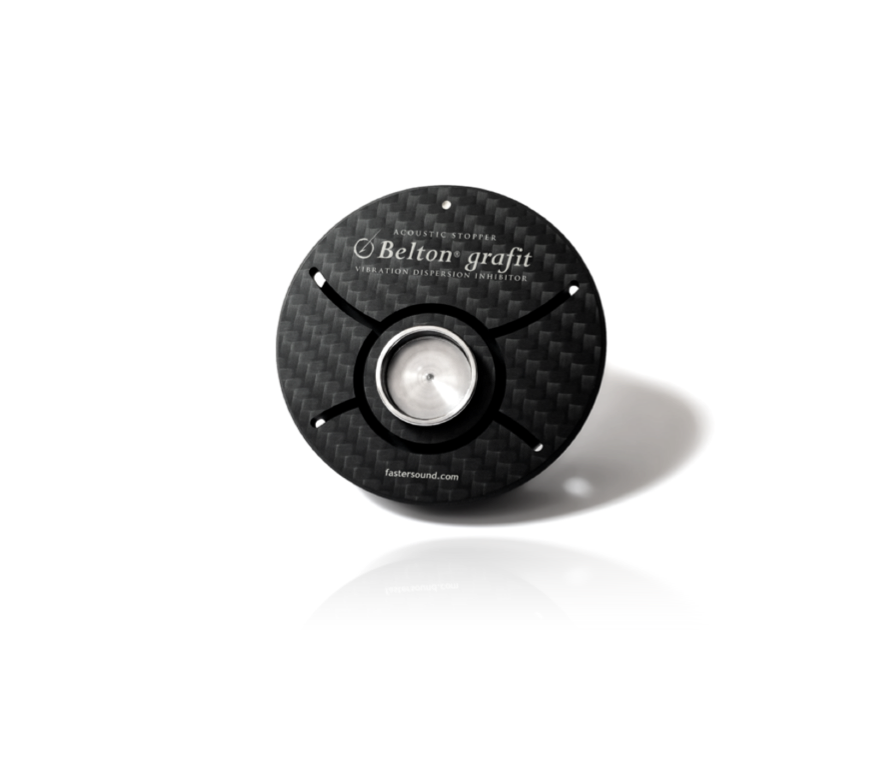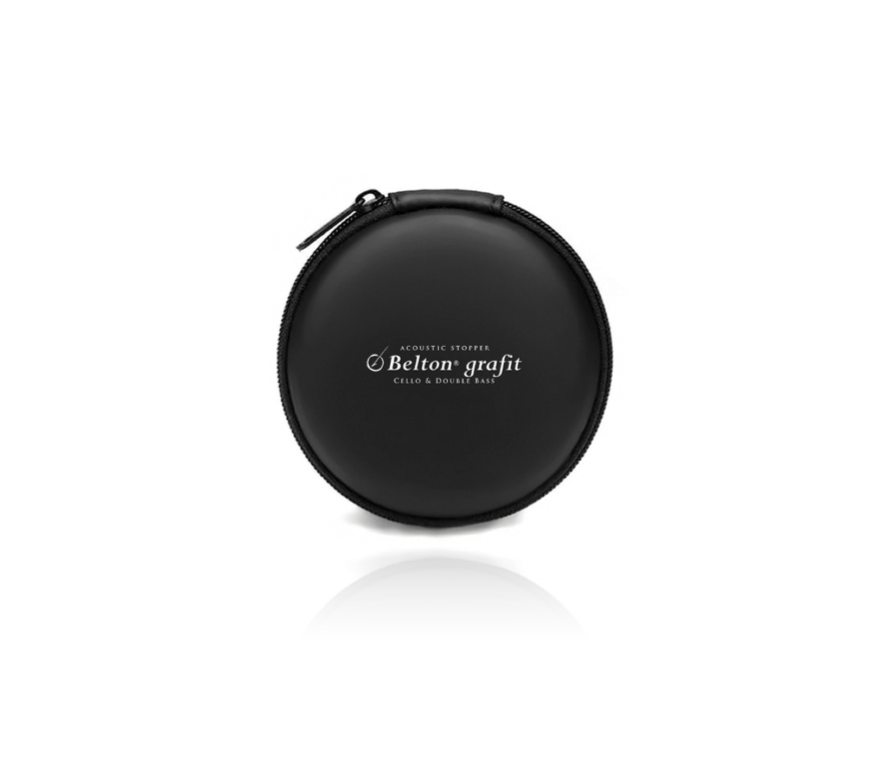BELTON Grafit – Cello Acoustic Stopper
Belton Grafit built in aeronautical carbon fiber is the smallest acoustic stopper for cello and double bass on the market. Its clean design and advanced materials give this small endpin stopper excellent acoustic qualities.
Belton Grafit includes in its interior design an acoustic device that acts as a vibration dispersion inhibitor, preventing, to a great extent, that the vibration of the instrument is absorbed by the ground, and consequently avoiding the loss of acoustic energy.
Belton Grafit incorporates a high-performance removable adhesive disc on the back, usable for more than a thousand applications and that can be washed with water and hand soap gel to remove dirt, thus recovering its adhesion.
Belton Grafit is supplied a small lever made of carbon fiber for removal as well as one removable replacement adhesive.
To ensure the proper functioning of Belton Grafit the contact area with the floor must be clean from dust and rosin. Before placing the endpin of the instrument on the Belton Grafit adhere this to the floor exerting a slight force with your foot on the small steel bowl. If this precaution is not taken, the adhesive discs could turn on themselves, canceling their main function.
The white dot and the logo stopper should be placed in front position.
Dimensions: OD 66mm
Total Height: 11mm
Total weight: 49gr.
Central bowl: Made of high hardness 316 stainless steel.
Body: manufactured in T700 aeronautical carbon fiber with prepreg fibers. The structure has been built following a fiber arrangement at 0º, 45º and 90º to offer maximum resistance.
Adhesive disc: made of high-performance removable adhesive silicone polyurethane with a 3M permanent adhesive side that should be placed on the opposite side of the floor.
When the adhesive disc loses its grip it can be washed just with water or water and hand soap. It should be dried gently with a towel and never with paper, since it will stick on the adhesive
disc. If that was the case, wash again with water until the paper is removed and adhesion is regained.
ATTENTION: Before placing the endpin of the instrument on the Belton Grafit adhere this to the floor exerting a slight force with your foot on the small steel bowl. If this precaution is not
taken, the adhesive discs could turn on themselves, canceling their main function.
Belton Grafit is supplied a small lever made of carbon fiber for removal as well as one removable replacement adhesive.
To ensure the proper functioning of Belton Grafit the contact area with the floor must be clean from dust and rosin.
***The white dot and the logo stopper should be placed in front position.
-
Edward Vanderspar
Principal violist. London Symphony Orchestra. England
The FASTER Titanium fitted to my old viola has freed the sound, improved the response, made the instrument more reliable when traveling to different climates, and is real fun to play. The viola feels very free and more powerful and speaks more easily. I think it is a fantastic and fascinating invention.
-
Mauro Rossi
Violin concertmaster - Milano, Italy
The Faster Titanium is incredible. The violin has been reborn in a whole new dimension. It is the best acoustic invention in the history of the violin.
Congratulations!
-
Pablo de León
Concertmaster. Orquesta Sinfónica Municipal de São Paolo. Brasil
I have used FASTER Titanium in my Oddone violin since its assemblage in London. The violin sounds very well, is freer, and has a quicker response thanks to an increase in harmonics.
It is undoubtedly an excellent tool for those seeking to enhance the qualities of their instrument, and for that, I recommend it!
-
Vlad Stanculeasa
Concertmaster - Orquesta Sinfónica de Barcelona. Spain
The FASTER Titanium belongs to the trained ear seeking out the precise balance between string pressure and freedom of sound. A unique tool in service of expressivity.
-
Michele Ferrari
Maestro Luthier - Cremona, Italy
I have installed many FASTER devices, and the result is outstanding.
Acoustic volume and ease of playing have increased to a great extent in all cases.
If you want to equip your instrument with a turbo, I recommend it to everyone, both musicians and luthiers.
-
Miguel Jiménez
Principal cellist - Orquesta Nacional de España. Madrid, Spain
Of the present plethora of acoustic cello endpins, the FASTER Artica Titanium stands out to a notably large extent. It is the result of years of research and experience by maestro luthier José María Lozano, and, like FASTER for violin and viola, enhances both the quality and the quantity of sound in a truly astonishing manner. That happens both from the player and the listener’s perspectives. However, if I had to choose only one out of the multiple advantages it contributes, that would probably be its outstanding feeling of convenience. That is noticeable in the immediate reaction of the string in contact with the bow, and the left-hand’s smoothness of articulation. That not only produces better acoustics-related results but also, thanks to that feeling of convenience, gets to increase the cellist confidence in their instrument and themselves. Not everyone can afford a Strad; however, a big step is within everyone’s reach with FASTER. In my opinion, it instantly gets to turn a cello into a better one without spending a fortune.
Maestro Lozano and his FASTER succeed in making us happier by substantially improving our experience with the instrument.
-
Giovanni Radivo
Concertmaster - Orquestre National de Lyon. France
I have installed the FASTER Titanium by maestro Lozano in my J. B. Vuillaume violin, and I am well satisfied with the surprising effect.
The sound is more bright, open, and rich in harmonics. The response of the strings during a bow stroke is much quicker. The instrument is undoubtedly more comfortable to use, and besides, the wolf tone that it had on the fourth string is practically gone.
I strongly recommend FASTER to everyone wishing to enjoy their instrument’s potential to the fullest.
-
Javier Monteverde
Sound Engineer - www.cezanneproducciones.com. Madrid, Spain
Following the tests carried out in Cezzane Recording Studios, aimed to check the empirical result and potential advantages of the mechanical device called FASTER for violin, I have observed that the device has real effectiveness in the instrument tone.
My perception as a sound engineer and producer of many chamber music and orchestra recordings that include the violin as a soloist instrument is that, with FASTER, the sound is louder and more broadly spread. Besides, those notes that, due to the instrument’s characteristics, were excessively loud, are now balanced, and the listener perceives a more steady and silky sound. After recordings of the same length of time, I have also noticed that, with the FASTER device, the microphones have captured an extra richness in harmonics and sound frequencies, because, far from changing the timbre of the violin, it enriches its sound and therefore the music coming out of it.






